Sparking change for the Smoke Eaters
Rich and Annie Murphy are the new owners of the Trail Smoke Eaters Hockey Club
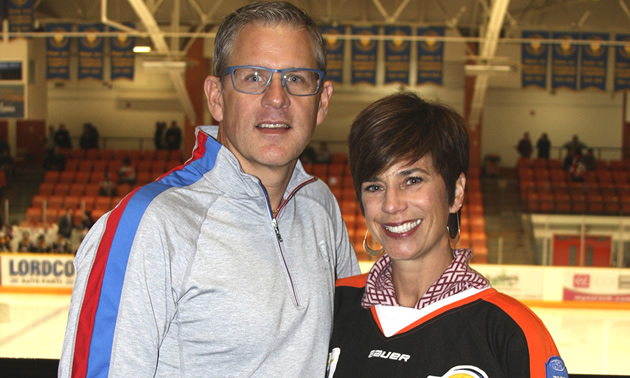
Rich and Annie Murphy bought the Trail Smoke Eaters Hockey Club in November 2016. — Jim Bailey/TrailTimes photo
Together, Rich and Annie Murphy make a strong team—he’s loyal, driven and dedicated; she’s soft-hearted, kind and friendly. They share a long-time passion for hockey and for supporting young men and women to succeed, and their own business success allowed them to buy the Trail Smoke Eaters Hockey Club in November 2016. They share the responsibility and decision making as well as the financial investment.
Since buying the club, the Murphys have bought a second home—a condominium at the Rossland ski hill. Their primary home is in Wayzata, Minnesota.
“There’s a learning curve, because this is a new adventure for both of us,” said Annie. “One part that’s been very exciting and heartwarming is the town of Trail and the community. We’re not from there, and they have welcomed us with open arms. That’s been one of the biggest highlights of owning this hockey team.”
Trail has had an established hockey team since around 1900, and for as long as it’s existed, the team has had ardent supporters in Trail. However, the club itself was struggling financially when the Murphys arrived on the scene.
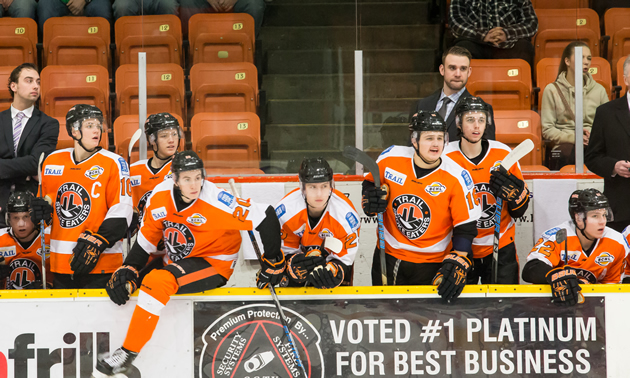
Players on the Smoke Eaters' bench are ready to explode onto the ice. — Mike Hockley photo
“We saw a town that desperately loves this team, but it was going to be difficult for the team to survive, going forward,” said Rich. “Trail is a beautiful town, a very loving town, and it’s given us a great opportunity.”
At the beginning of last season, the Smoke Eaters hadn’t made the playoffs in five years, and only about 600 to 700 fans attended the season opener. Rich believes that the key for the club’s survival is twofold: the team must be competitive, and its events must appeal to the general public as well as to avid hockey fans.
“There was no video screen and nothing going on between periods,” Rich said. “We did a few things and by the end of the season we’d average about 1,100 fans per game. We made the playoffs, and averaged between 1,800 and 2,000 fans per game.”
To the delight of fans, a huge new video screen has been installed in the arena, showing the games along with instant replays. Spectators see commercials for corporate sponsors and other advertisers, interactions with fans via social media, and—most fun of all—they see live fan involvement.
On game nights in particular, the club’s management continues to rely on the team’s faithful volunteers, but the Murphys lost no time hiring paid, full-time staff: a director of hockey and business operations, a corporate sales and event manager, a marketing and sales assistant, an operations manager, an athletic therapist, a head coach/general manager and an assistant coach, along with a part-time director of media operations. All but two of these are local people.
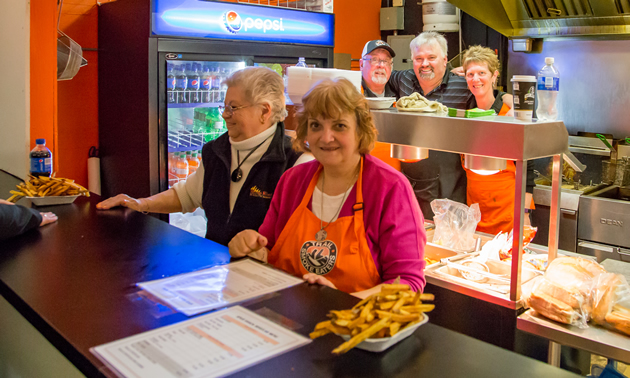
The Trail Smoke Eaters Hockey Club has always been able to rely on its staunch game-night volunteers. — Mike Hockley photo
Turning their attention to the Cominco arena itself, the Murphys observed that the City-maintained areas were well kept and attractive—the City’s pride in the arena was quite evident. However, the Smoke Eaters club was responsible for taking care of its own lower-level facility within the arena, and it had not had the funds to maintain or improve the space.
Dark, cramped and inadequate space and amenities have been brightened, reconfigured, enlarged and improved. The old locker room has been redesigned to provide a new coaches’ office, training/physio room and skate sharpening room. The former coaches’ office is now the equipment room. With approval from the City, additional space has been converted into a new locker room, bathrooms, a weight room and a players’ lounge. This area has been outfitted with a new heating and air exchange system, and new windows have been installed.
When the tally is done, including the purchase price of the team, the facility renovations and some facelifts to the arena level, the Murphys’ investment in the club will be pretty close to $2 million.
Annie’s kind heart is evident when she talks about the Smokies—she typifies the “Minnesota nice” character.
“Junior hockey can be a grind,” she said. “These boys work hard. They travel hard. They’re young, they’re away from home, and there’s a ton of expectations put on them by the team and the community and their families, and even by themselves. The team and the facility become their family and their home. It’s a brotherhood, and those friendships are important.
“I think one of the most exciting things for us is creating a new spark and a new direction for the team, and seeing the excitement of the players about the new facility. I love that facet of it, giving that opportunity to the boys.”
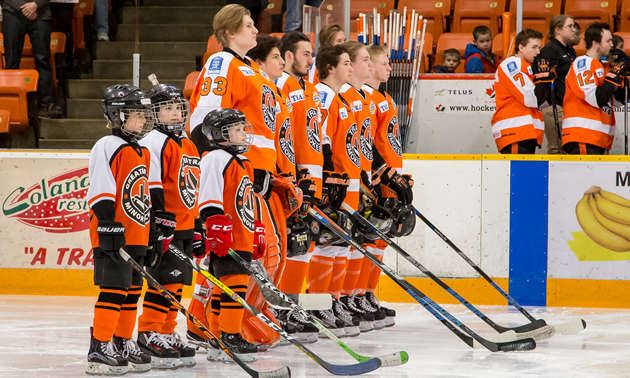
The Smoke Eaters and their young fans stand for the national anthem. — Mike Hockley photo
“We didn’t get into this to make a ton of money,” said Rich. “Obviously we want this company to be self sufficient, but the money we make will go back into the team, the staff and the community.
“We’d love to take a certain amount of our profits to establish a college or university fund for a local student—and they wouldn’t even have to be involved in any sport. We’re building a great relationship with the local high school, and local students are helping us with our game night video production in the hope of getting some credits for school or volunteer hours.
“We enjoy working with kids, seeing young men and young women succeed. That’s our motivating factor—to help kids realize a dream.”

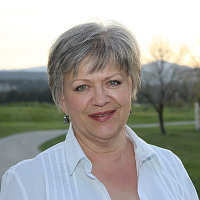
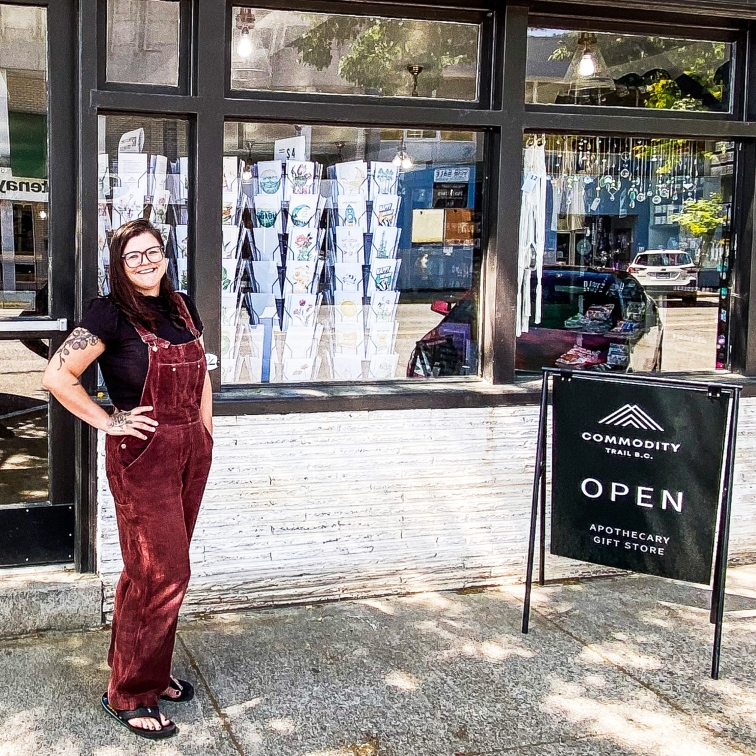
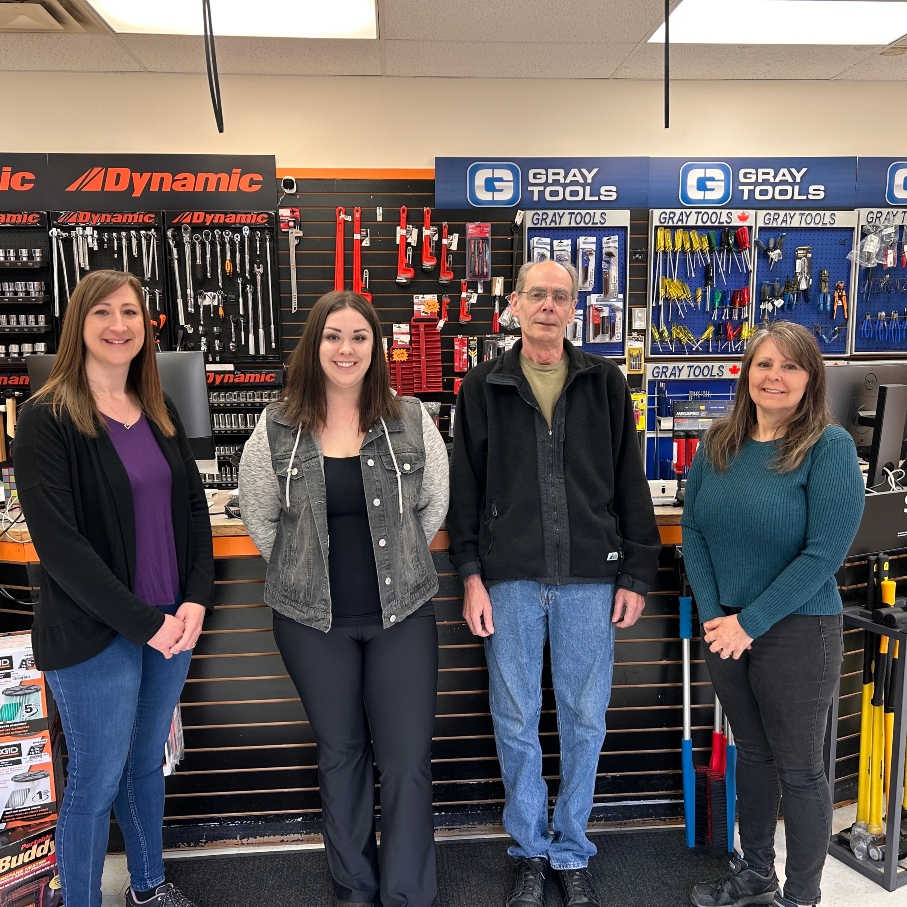


Comments